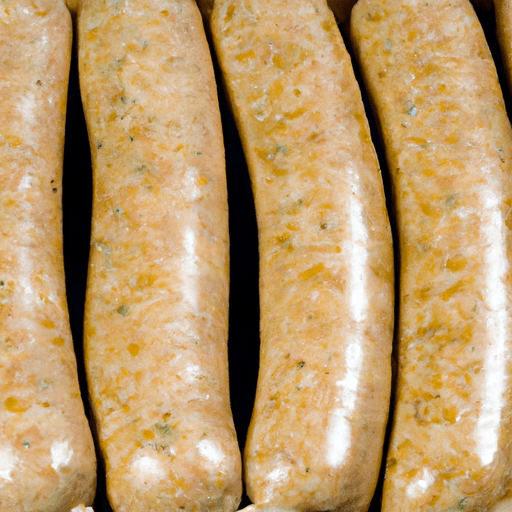Everything You Need to Know About Turkey Bratwursts
Turkey bratwursts are a delicious and healthier twist on the traditional bratwurst. Made with lean turkey meat instead of pork, these sausages offer a flavorful and savory experience with a healthier nutritional profile. Whether you’re trying to cut back on red meat or simply looking for a tasty alternative, turkey bratwursts are an excellent choice. In this post, we’ll dive into the details of this delectable sausage, including its taste, common uses in cooking, nutritional value, and a few interesting facts. Let’s get started!
Taste and Texture
Turkey bratwursts have a wonderful flavor that combines the mildness of turkey with the savory seasonings typically found in bratwursts. The herbs and spices used in the preparation give it a distinctive taste, commonly described as a balanced blend of light and smoky flavors. The texture is moist and slightly firmer than traditional pork bratwursts, making them perfect for grilling or pan-frying.
Common Uses in Cooking
Turkey bratwursts are versatile and can be used in various recipes. Here are a few popular ways to enjoy them:
- Grilling: Fire up the grill for a classic summer treat. Cook the turkey bratwursts over medium heat, turning occasionally until they are cooked through and have a beautifully caramelized exterior.
- Pan-frying: Heat up a skillet with a little oil and cook the bratwursts over medium-high heat. This method allows you to control the cooking temperature and results in a deliciously browned exterior.
- Stews and Casseroles: Turkey bratwursts can also be sliced and added to hearty stews or casseroles. They contribute a burst of flavor and work exceptionally well with a variety of vegetables.
Nutritional Value
Turkey bratwursts are well-known for being a healthier alternative to traditional bratwursts. They offer a lighter option while still satisfying your craving for a savory sausage. Here’s a breakdown of the nutritional value of turkey bratwursts:
- Lean Protein: Turkey is a fantastic source of lean protein, which is essential for muscle growth and repair. A single turkey bratwurst can provide approximately 20 grams of protein, making it a fulfilling addition to your meal.
- Lower Fat Content: Compared to pork bratwursts, turkey bratwursts contain lower levels of saturated fat. This makes them a heart-healthy choice, as excessive consumption of saturated fats can contribute to various health issues.
- Vitamins and Minerals: Turkey bratwursts also offer essential vitamins and minerals, including vitamin B12, selenium, and niacin. These nutrients play vital roles in metabolism, energy production, and overall well-being.
Interesting History and Facts
Did you know that bratwursts have been enjoyed for centuries in various cultures around the world? The word “bratwurst” originates from Germany, where it has been a culinary staple for over 500 years. Traditionally made with pork, the popularity of bratwursts has since spread to different countries and sparked creative variations like the turkey bratwurst we know today.
Turkey bratwursts gained popularity in the late 20th century as people started seeking healthier meat alternatives. They quickly became a hit due to their leaner profile without compromising taste and satisfaction. Today, they are widely celebrated as a delicious option for those looking for a lighter, yet flavor-packed sausage.
Conclusion
Turkey bratwursts are a fantastic choice for those who crave the classic bratwurst experience while opting for a healthier protein source. With their perfect blend of flavors, they bring something unique to any dish they’re added to. Whether you’re grilling, pan-frying, or exploring creative recipes, turkey bratwursts are a versatile and nutritious addition to your cooking repertoire. So why not give them a try? Your taste buds and body will thank you!
Note: Remember to always follow safe cooking practices and ensure that turkey bratwursts reach an internal temperature of 165°F (74°C) for optimal food safety. Enjoy responsibly!
Are you hooked on turkey bratwursts? Share your favorite recipe or cooking method in the comments below!
Turkey Bratwursts:
Origin: Bratwurst is a type of German sausage that originated in the region of Franconia in the early 14th century. It is traditionally made with pork, beef, or veal, but turkey bratwursts are a variant made with turkey meat.
Common Uses: Turkey bratwursts are commonly enjoyed as a flavorful and healthy alternative to traditional pork bratwurst. They can be cooked in various ways, such as grilling, pan-frying, or simmering. These sausages are often served in buns with mustard and sauerkraut, or used in dishes like sausage stews or casseroles.
Nutritional Benefits: Turkey bratwursts are a leaner option compared to pork or beef bratwursts, as turkey meat is generally lower in fat. They are a good source of protein, providing essential amino acids needed for muscle growth and repair. Additionally, turkey bratwursts can be lower in calories and cholesterol, making them a healthier choice for those watching their intake of these nutrients.
Unique Properties: Turkey bratwursts offer a milder and slightly different flavor compared to pork or beef bratwursts. The use of turkey meat can result in a lighter and leaner sausage, while still maintaining the essence of bratwurst. Some variations of turkey bratwurst may also include additional ingredients, such as herbs, spices, or even fruits, to enhance the flavor profile.
Historical Significance: While turkey bratwursts have gained popularity in recent years due to the increased demand for leaner meat options, their historical significance is tied more closely to the traditional pork, beef, or veal-based bratwursts. Bratwursts have been a staple in German cuisine for centuries and are often associated with cultural festivals, such as Oktoberfest, where they are enjoyed alongside beer and other traditional foods.




Use the share button below if you liked it.
It makes me smile, when I see it.